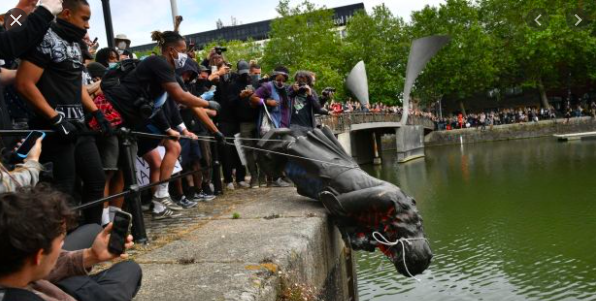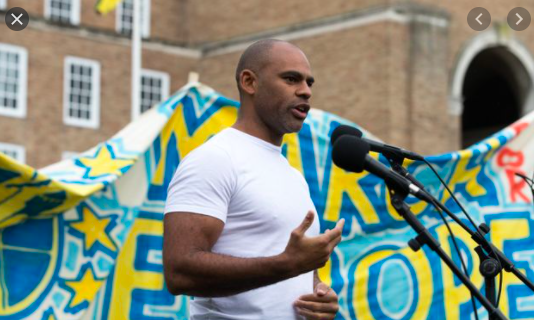Britain divide as controversial statue is torn down by Black Lives Matter protesters
- Kia Fullerton

- Jun 8, 2020
- 2 min read
Black Lives Matter protesters in Bristol have torn down the controversial statue of a slave trader and rolled it into the River Avon, as thousands of people marched against police brutality following the death of George Floyd.
The memorial to Edward Colston, who made his fortune in the slave trade in the 1600s, has remained in the city centre since 1895.
On Sunday protesters tied a rope around the head of the statue and pulled it to the ground.
It was then rolled from the city centre and dumped into Bristol’s harbour.
Home secretary Priti Patel, said the toppling of the statue was "utterly disgraceful" and stated on Twitter, "These demonstrations have been subverted by thuggery. Justice will follow".
Bristol like many other counties in England, has a dark past with its association in the slave trade during the 18th century. But recently more than 11,000 people had signed a petition to have the statue pulled down, following numerous calls in the past to have it removed.
Edward Colston was a member of the London-based Royal African Company in 1680, which at the time had the monopoly of Britain’s slave trade. By 1689, the company had transported around 100,000 enslaved Africans in chains to the Americas, who were branded with the firm’s initials RAC on their chests.
Due to the actions of protesters, this has caused a divide of opinion as some are supportive of the statue being destroyed while others believe this is a violation of Britain's lifelong history.
The mayor of Bristol, Marvin Rees who is of Jamaican heritage, said he did not support social disorder, but "cannot pretend" to have "any real sense of loss" for the statue. Whereas, Boris Johnson argues demonstrators "are a betrayal of the cause they purport to service" and demands those responsible to be held accountable.
The scene in Bristol marks a significant moment in history, as it has awaken the debate about Britain's attitudes towards racism and its dealing with its imperialist past. In light of this news Ben Harding, 22, said "Statues are supposed to be for aspirational figures, representing the best of our society".
Dominique Vincent, 20, argued that this has event has changed the narrative of Black Lives Matter movement. "We cannot change the racist past, we should just accept it and not repeat ourselves".
Since the event, many people across the UK are calling on the government to remove statues that symbolises Britain's racial history. For instance, The "Rhodes Must Fall" campaign, has been demanding Oxford university to remove the statue of Cecil Rhodes .
Campaigners seek that the statue of Rhodes - a 19th Century businessman and politician in southern Africa - to be removed as they believe he represented white supremacy.
They have described Oriel College's decision to not to remove the statue, as "outrageous, dishonest and cynical". The decision to keep the statue was down to threats, to withdraw gifts and bequests worth more than £100m if it was taken down.
It is clear that the UK is at a divide on this issue, hopefully this opens doors to a more in-depth discussion on the foundation of Britain and its imperialist history.


















Comments